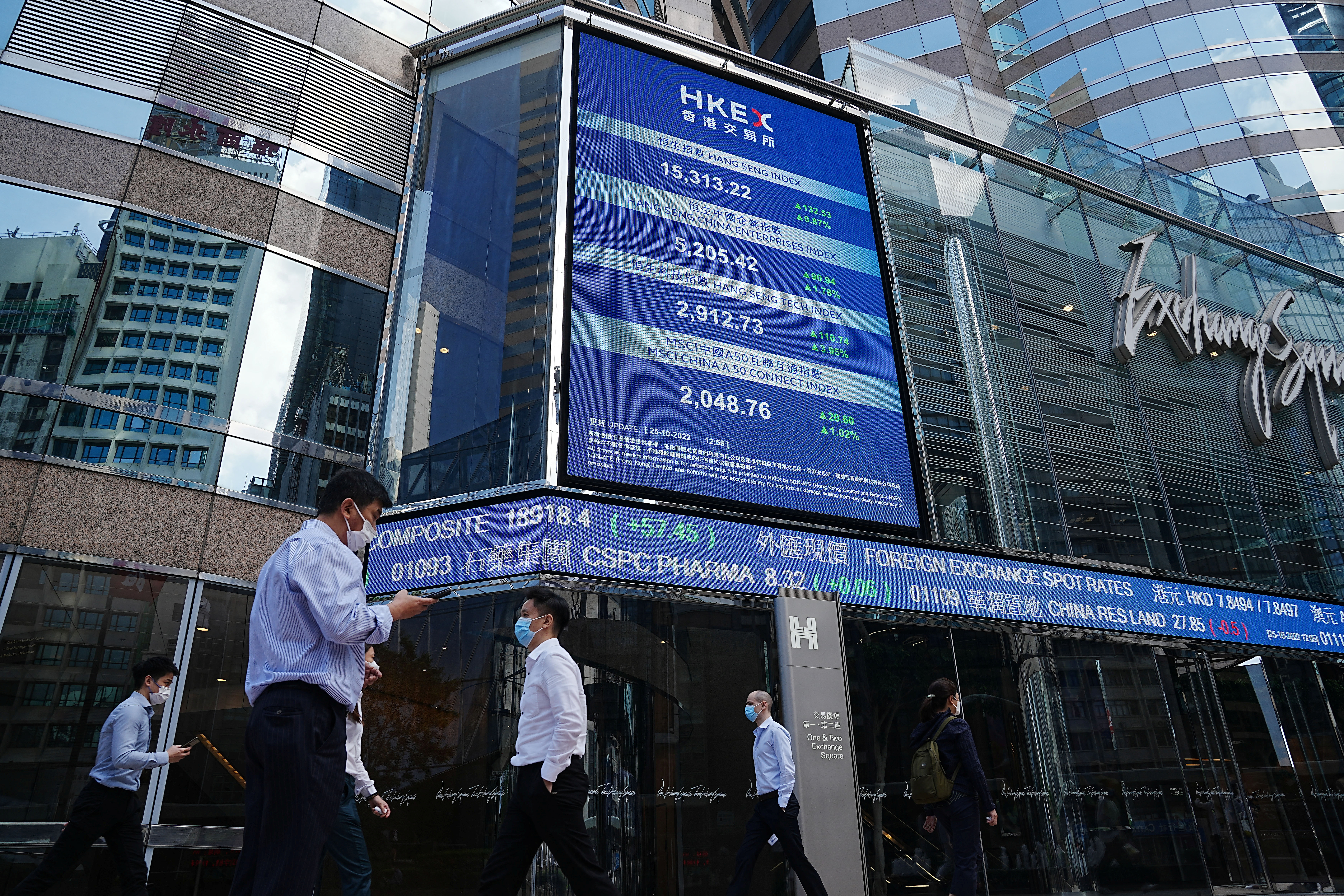/cloudfront-us-east-2.images.arcpublishing.com/reuters/H3NFM5EQBRIVNGAREZACU6XADY.jpg)

People walk in front of a screen displaying the Hang Seng stock index in the Central District, in Hong Kong, China on October 25, 2022. REUTERS/Lam Yik/File Photo Obtaining licensing rights
SINGAPORE (Reuters) – Asian shares rose on Tuesday ahead of a key US inflation report that could severely impact the Federal Reserve’s (US central bank) policy outlook, while the fragile yen approached its lowest levels in 33 years, putting it back in the intervention zone.
MSCI’s broadest index of Asia-Pacific shares outside Japan (.MIAPJ0000PUS) rose 0.23%, on track for a second straight day of gains.
The price of the Japanese yen reached 151.71 yen to the dollar during the Asian hours, after touching its lowest level in a year at 151.92 on Monday. If the struggling currency breaks above last year’s low of 151.94, it will hit a new 33-year low.
Japanese Finance Minister Shunichi Suzuki said Tuesday that the government will take all necessary steps to respond to currency movements, repeating his usual mantra that excessive volatility is undesirable.
European stocks are also expected to remain weak, with Eurostoxx 50 futures down 0.05%, German DAX futures down 0.01%, and FTSE futures down 0.15%.
Investors are awaiting the US inflation report, due later today, after Federal Reserve Chairman Jerome Powell and other policymakers said they were still not sure interest rates were high enough to tame inflation.
Economists polled by Reuters expect headline consumer price inflation in the United States to slow to 3.3% in October from 3.7% in September, with the so-called core inflation rate, which excludes volatile components, remaining unchanged at 4.1%.
“This data has a significant impact on the Fed’s future policy direction,” said Anderson Alves, a trader at ActivTrades.
“An error, especially in the less volatile component of core inflation, may lead traders to believe that the Fed may hold back from further hikes. Conversely, any win could lead to a noticeable repricing on the US short-term interest curve.” “
Chinese stocks fell marginally, with the CSI 300 Index (.CSI300) down 0.19% while Hong Kong’s Hang Seng Index (.HSI) rose 0.09%, ahead of a summit between top leaders from the world’s two largest economies. Later this week.
Yields on 10-year Treasury bonds were 4.630%, down slightly from Monday’s one-week high of 4.696%.
Markets mostly took their cues from Moody’s move to downgrade the US AAA credit rating outlook to “negative” from “stable” on Friday. Moody’s decision comes after its competitor, Fitch, lowered the top credit rating of the United States in August.
“With the presidential election just a year away, the government is unlikely to announce significant proposals to address these issues, given the unpopularity of promising spending cuts and tax increases,” said Gary Duggan, chief investment officer at Delma Capital.
The United States faces another partial government shutdown starting Saturday if Congress does not approve a temporary spending bill.
He resumes watching Elaine
The Yen’s broad decline has traders back watching whether Japanese authorities will intervene, with US inflation data likely to be the driver behind the next major move.
The last time Japan intervened in the currency market by selling the dollar and buying the yen was in October of last year. Intervention data released last month showed that authorities have moved away from taking further such measures since then.
The currency has fallen about 14% against the dollar so far this year.
The yen jumped briefly against the dollar in New York hours on Monday after reaching its lowest level since the beginning of the year, which analysts attributed to a wave of trading in options that will mature this week.
Nicholas Shea, a strategist at Standard Chartered Bank, said fluctuations in the yen signal that markets are concerned about potential intervention, which helps curb excessive speculation.
“In a way, market participants are doing the Treasury’s job for them, as markets begin to guess the price movement behind any sudden decline in the dollar against the yen,” he said.
The dollar index, which measures the US currency against six competing currencies, rose 0.057% to 105.69. The index fell 1% in November, on track to end a three-month winning streak.
Oil prices rose slightly after an OPEC report said market fundamentals remained strong. US crude rose 0.27% to $78.47 per barrel, and Brent crude recorded $82.73, rising 0.25% during the day.
Reporting by Ankur Banerjee, Editing by Shri Navaratnam and Miral Fahmi
Our standards: Thomson Reuters Trust Principles.

“Web maven. Infuriatingly humble beer geek. Bacon fanatic. Typical creator. Music expert.”





More Stories
Dow Jones Futures: Microsoft, MetaEngs Outperform; Robinhood Dives, Cryptocurrency Plays Slip
Strategist explains why investors should buy Mag 7 ‘now’
Everyone gave Reddit an upvote